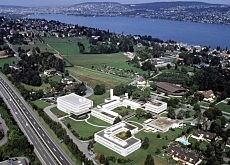Microsoft calls for more focused IT education

Computer sciences teaching in Switzerland must be enhanced to produce enough high-quality graduates to meet increasing staffing demands, according to Microsoft.
Microsoft Switzerland general manager Peter Waser believes the Federal Institute for Technology in Zurich should team up with colleges to promote information technology and attract more students.
The United States computer firm has doubled its staff in Switzerland to 450 in the past five years but is increasingly forced to look to other countries for new recruits. Its workforce now comprises 28 nationalities with the proportion of Swiss decreasing.
Waser told swissinfo that something needed to be done to redress the balance, starting with the education system.
“The legal and tax systems along with a liberalised market make Switzerland an attractive place for us, but where we do have a problem is education in the field of IT. There is not enough focus on that,” he said.
“The challenge in Switzerland is to generate enough qualified people to meet the needs of a knowledge-based society.
“The Federal Institute for Technology in Zurich is very well known but there are also a number of colleges with IT courses that are relatively unknown. It would be beneficial for [the institute] to collaborate more with smaller institutions and support them with their brand. This would help level out the present inequality.”
Collaboration started
Professor Jürg Gutknecht, head of computer sciences at the institute, said the current implementation of the Bologna system that harmonises European tertiary education systems is already enhancing collaboration between Swiss institutions.
“The two-tier Bachelor-Master model allows students to compose their curriculum from parts taken at different schools and to customise their educational profile to a very high degree,” he said.
Gutknecht added that a one-size-fits-all model for computer sciences would not work as different industries have different requirements of IT graduates.
Thomas Flatt, president of the Swiss Institute of Computer Technology (ICT), believes students have been put off taking IT courses in the past few years following the burst of the dotcom bubble at the turn of the century.
Missed the boat
Flatt also believes that Switzerland missed an opportunity to create its own computer and software industry by not taking a leading role at the start of the IT revolution.
He believes leading companies such as Microsoft, Google and IBM would be establishing their headquarters and main research centres in Switzerland rather than smaller outposts had the country acted earlier.
“One key element is the risk adversity in Switzerland – people do not start up companies in their own garages here. Another problem is the lack of financing and venture capital as opposed to the US,” he told swissinfo.
“It is really sad that a country that is so strong in engineering did not participate in the early days of the technology when it was engineering driven.”
He added: “We should not give up, but we should really think about how to make Switzerland a world leader in niche sectors or in the latest technologies.”
swissinfo, Matthew Allen in Zurich
Microsoft has been present in Switzerland since 1990 and last year unveiled a new innovation centre in Zurich after buying Zurich-based company media-streams.com. It also has a presence in Geneva, Basel and Bern.
The company announced in Zurich on Tuesday that the launch of the new operating system Windows Vista helped boost Swiss growth in the financial year 2006-7 by 19.1 per cent compared with a 15 per cent growth for the group as a whole.
US internet search engine giant Google set up its European research and development centre in Zurich in 2004. It plans to move to a larger site in the city and will reportedly increase its staff levels from around 200 to 1,600.
IBM has been in Switzerland since 1956 and set up a research laboratory in Rüschlikon, Zurich, in 1962.

In compliance with the JTI standards
More: SWI swissinfo.ch certified by the Journalism Trust Initiative












You can find an overview of ongoing debates with our journalists here . Please join us!
If you want to start a conversation about a topic raised in this article or want to report factual errors, email us at english@swissinfo.ch.